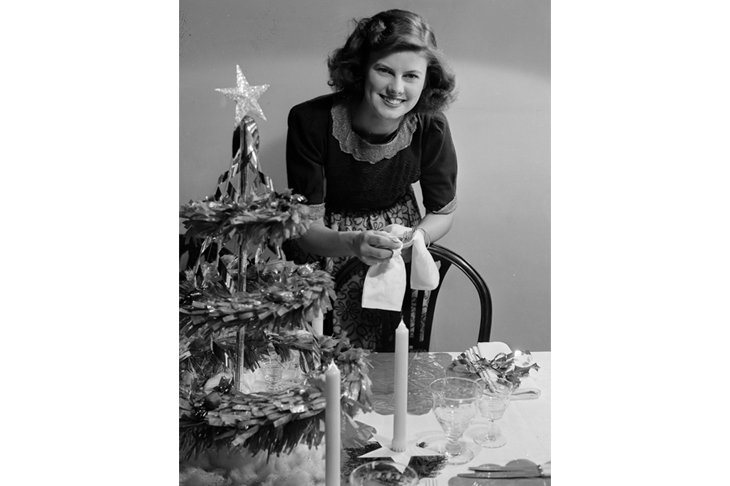It is over 65 years ago that I first saw the Pacific Ocean and years before I was introduced to black and white television. At Christmas (early Fifties), the family would climb aboard the ‘Dodge’ and the ‘Fargo’ pickup and head to Manly for a beach holiday. Driving from Wellington in the Central West you had to negotiate the very steep approaches to the Blue Mountains on the Lithgow escarpment. The narrow road was usually littered with motor cars spewing clouds of steam, January being the overheating time on those roads. It was rather frightening for us children as the edges of the road seemed to drop away to infinity. Tensions lessened as we descended to Parramatta and crossed the Hawkesbury Plain. Somewhere through French’s Forest at the end of a hot asphalt road there it was, a wedge of bright ultramarine blue fluttering slightly in the haze – the Pacific Ocean.
Christmas by its very nature has probably changed very little since then. No doubt the sentiments are still the same. Gifts have changed; monogrammed handkerchiefs received from distant relatives have disappeared as nasal effluent is cleared up by tissues.
The toys were made from pressed tin or plastic. Games were mostly cardboard, kites and model planes, balsa wood or fabric, cowboy and cowgirl suits, used leather and cotton tassels to go with the chromed metal ‘cap’ pistols and rifles (caps were spools of paper with small explosive charges that went ‘bang’ when you pulled the trigger). There were no batteries and no product noise. Transistors had not yet arrived and anything that required energy like a Hornby train set used a wind-up spring for energy.
The significant gifts were the ones that marked small milestones; Speedwell bicycles, a watch, a gold bracelet (for girls), a .22 pea rifle (for boys), a calibre inadequate for a young man these days. I was given my first rifle when I was nine or ten. My father and the men on the property instructed me on safety. It was certainly a rite of passage and I managed to shoot enough rabbits to feed some of the dogs. At Christmas the days and evenings could be very hot and sultry. Stuffy bedrooms with excited children trying to see Santa. We did manage to see Santa one year – turned out to be Dad – stumbling into the bedroom with a bicycle. There was always a rather droopy pine tree in the living room with gifts boxed in crinkly red and green paper scattered around its base, children ripping open packages watched by rather tired and bleary-eyed parents whose Christmas Eve was embellished by Mozart, Johnny Walker and whitebait (that came in glass bottles) on toast. All of this was accompanied by the repetitive swish of the sprinkler and the beautiful smell of hot lawn being damped down as the evening came on.
Despite the climate the Christmas menu remained very stubbornly English in style. It would all be laid out with great care on a large, polished cedar table covered with a white-pressed linen cloth. As I remember it the men drank beer or whisky with water, soda, ice or occasionally ginger ale and the women shandy, brandy and water or soda, gin and tonic or a little sherry. When asked whether she would like a drink my grandmother Linda Webb replied, ‘No, dear, just a little sherry’, a typical aside.
Families who ran grazing properties tended to be socially isolated. Most interactions took place around the schools, commercial activities of the towns, the sale yards and hotels. Events like race meetings, polo matches, tennis parties and of course Christmas were significant celebrations as they brought neighbours and friends together. This is still the case in many parts of rural Australia. There was very little take-away food in the Fifties and you only went to a restaurant or a café if you had made a lot of money or someone had died. Most communications were by post, urgent ones by telegram. The telephone was on the wall at our house. You had to crank the handle to tell the telephonist the number that you required. It was a party line and a careful user always listened to the number of clicks to know how many parties were listening in.
Here’s the Christmas menu at Umargalee, Wellington, NSW, 1950’s perhaps a little unreliably remembered and maybe a little optimistic in retrospect but certainly better than mutton and beer:
Baked turkey put in the oven at 5am
Glazed ham with pineapple and cherries studded with cloves
Devilled eggs (curried)
Beetroot in aspic
Cucumber salad
Cauliflower in white sauce
Roast potatoes in dripping
Bread and butter pudding
Christmas plum pudding served flambé with brandy butter and the risk of choking on a sixpence
When my mother lay dying, Dad kindly suggested I put one of my paintings in her room. It was called ‘European memoir’. I remember this grey seascape sitting on the mantlepiece slashed by the afternoon light through venetian blinds. Years later on a warm evening a couple of well-mannered police officers came across the lawn at my house in Bathurst. They told me that my father Austin was dead. He lived in Lithgow some 40 minutes away and I drove through the darkening landscape to his house. The interior was silent and I felt for the switch and with light his passed life flickered up; the tables, chairs, couch and rugs, a bookcase filled with all the titles. The graphics on the bindings familiar from decades past. There was a vague smell of old cooking but there was no smell of the man. The music that he loved was stacked silently in the bookcase. His beloved Mozart, Beethoven, Brahms, Fats Waller and Puccini. All the books, all the biographies, all these histories, journals and memoirs sat mute. Not to be opened again or not by Dad. In the morning I collected his watch and glasses from the police in Lithgow. I was most touched by the condolences of a young police officer. He graciously appeared to be concerned. I proceeded to the hospital to identify Dad’s body. After a short wait he was wheeled out on a gurney covered by a white sheet. I was left alone and I drew it back and there was his face – laconic, restful but slightly discolored. I touched his forehead. It was very cold. That is the test. My father’s mother died when he was 6 and he went to work at 13 years of age. He would never mention his own father.
I once had a couple of dogs; a long-nosed foxed terrier, Billy and a black lab cross, Bunter. I took them out to a huge claypan near Enngonia in western New South Wales and they became so disconcerted by the desolate space that Bunter lifted his leg on Billy. We have all been there. Sometimes life is rather frightening but memories can be a great help and comfort.
Merry Christmas to you all.
Got something to add? Join the discussion and comment below.
Get 10 issues for just $10
Subscribe to The Spectator Australia today for the next 10 magazine issues, plus full online access, for just $10.
You might disagree with half of it, but you’ll enjoy reading all of it. Try your first month for free, then just $2 a week for the remainder of your first year.















Comments
Don't miss out
Join the conversation with other Spectator Australia readers. Subscribe to leave a comment.
SUBSCRIBEAlready a subscriber? Log in